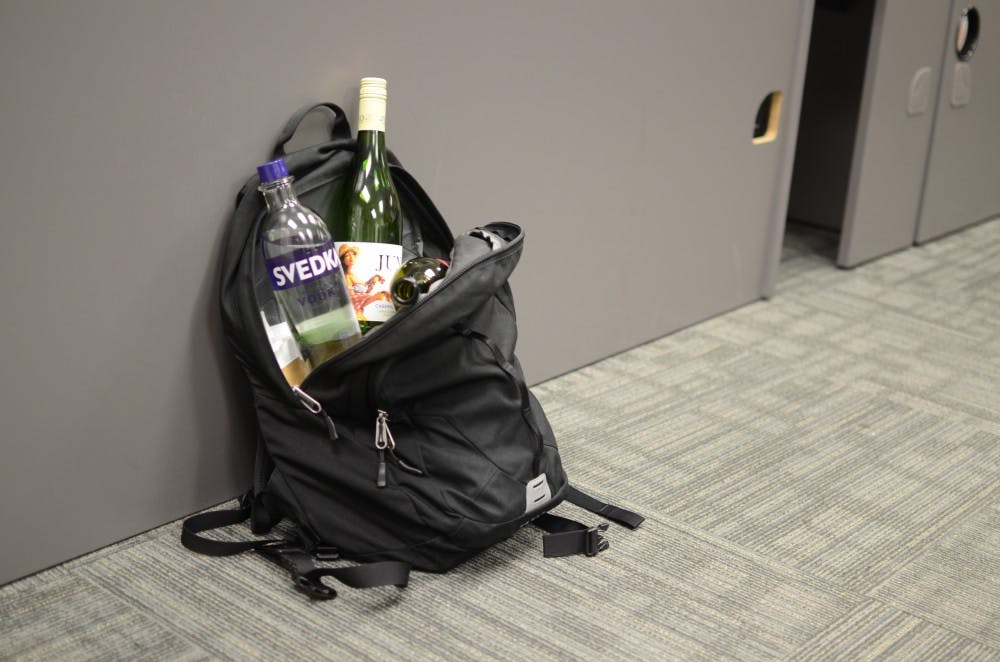The University is planning to review its ban on alcohol in residence halls with the construction of new residence halls on East Campus.
With the construction of new residence halls on East Campus, some other halls like Cassell and Nebraska may eventually become spaces for upperclassmen, Vice President for Campus Life Gail Hanson said. This means that many of the residents in these halls would be of legal drinking age.
“We’re asking ourselves and seeking input on whether or not we can manage a reasonable residence life if people of a legal drinking age are allowed to drink under certain circumstances, in certain halls,” Hanson said.
Hanson said that a re-examination of the policy may happen this year.
The University is expecting more non-freshmen to stay on campus once East Campus is built, Assistant Vice President for Housing and Dining Programs Chris Moody said in an email.
East Campus is expected to mainly house sophomores, Hanson said. Nebraska is expected to house mostly seniors, while Cassell is expected to primarily house juniors with some seniors.
“If we start to get residences where the overwhelming population is 21, then we just want to take a look at [the policy] and see what it would mean if we had a different policy,” Hanson added.
Discussions about changing the alcohol policy in residence halls are preliminary, and no final decisions have been made, Moody said in an email.
“We are looking at the policies of other campuses to determine the benefits and challenges of considering a possible change,” Moody said in an email. “The law still requires an individual to be 21 or older to be able to drink, so any policy changes would only affect students who meet that age requirement.”
Currently, the majority of students living in residence halls are under 21-years-old, Hanson said. Alcohol is currently banned in all residence halls, even for those students of legal age, according to AU’s Student Conduct Code.
However, alcohol is not entirely banned on campus. It is allowed at University-sponsored events, so long as it is approved ahead of time and certain other regulations are followed, according to the Policy on Alcohol Service at University Events.
“We try to set reasonable expectations, educate people, hold them [students] accountable,” Hanson said. “The law is the law, we have to live within it.”
Under the current policy, punishments for alcohol possession or use in residence halls can vary. The conduct code does not lay out one specific punishment, Hanson said.
First-time minor violations may result in warning letters or educational assignments, according to the Annual Security Report, a yearly report detailing crime and violations on campus. However, the report does not clarify what constitutes a minor violation.
Second-time minor offenses may result in participation in an alcohol education program or disciplinary probation. Repeated violations can lead to sanctions as severe as dismissal from the University, though this is determined on a case-by-case basis.
“A student could potentially face removal from University housing, suspension (which typically lasts for one semester), or permanent dismissal from the University,” Director of the Student Advocacy Center Adam Garret said in an email.
These more serious repercussions may be implemented if a student has a third alcohol violation, was on non-academic probation when the supposed violation happened, has a substance abuse problem that would be best addressed outside of the University or has additional violations, like possession of illegal drugs, Garret said in an email.
Assistant Director for Training and Leadership Programs for Housing and Dining Timothy Staples said that another component of handling an alcohol violation is determining whether the student needs to see a drug or alcohol counselor.
“I am more concerned now not just about students that are drinking, it's the students who are using alcohol as a mechanism to cope with distress,” Staples said.
When alcohol is discovered by a resident assistant, or if another student alleges a violation, the RA is required to report it, Director of Residence Life Lisa Freeman said.
“[RAs] don’t determine guilt or innocence, they just report incidents,” Freeman said.
One controversial part of the policy is that students can be punished for knowingly being in the presence of alcohol, even if the student is not drinking.
“It’s a regulation that students have said they’re troubled by, that it’s unpopular and we’ve looked at it a number of times and we’ll continue to look at it,” Hanson said. “But it seems to be the only way to say to students ‘alcohol is not permitted in the residence hall.’ If you are knowingly in its presence at a party, you’re responsible for it.”
Hanson added that this component of the conduct code was unpopular among students but necessary.
“It gets us around this fact that before this regulation was in place, nobody took any responsibility for it and it was very hard to hold people accountable,” Hanson said.





